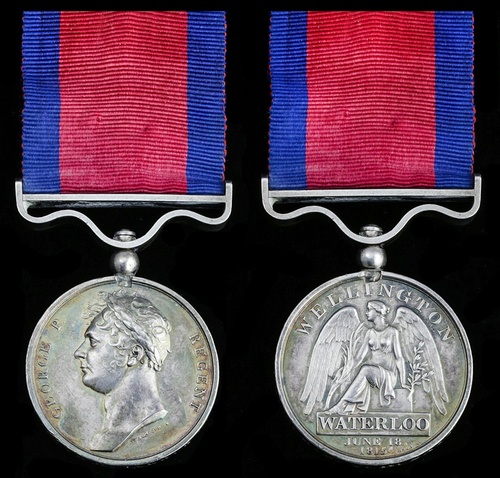
Auction: 18002 - Orders, Decorations and Medals
Lot: 29
Waterloo 1815 (Assist. Surg. W. Barry, 1st Batt. 40th Reg. Foot.), fitted with ornate replacement silver ball and swivel bar suspension, good very fine
Provenance:
Harris Collection, Sotheby's, June 1984.
Glendining's, December 1985.
William Barry was born in February 1785, second son of the Reverend Henry William Barry, Vicar of All Saint's, Hereford. Having been a Hospital Mate, he was appointed Assistant Surgeon in the 40th Foot in January 1810.
Having then served with the Regiment at Busaco, Nivelle, Orthes and Toulouse, Barry would have been stationed at Ghent with the 1st Battalion in early 1815. On 26 May 1815, Major A. R. Heyland arrived with a detachment from the 2nd Battalion and assumed command. With the possibility of battle rising to fever pitch, the Regiment was ordered to arms at 30 minutes' notice on 16 June. Marching constantly for the best part of two days, with scarcely time to rest, they reached the lines on the eve of the battle. The Regimental History takes up the story:
'The next morning, the ever memorable 18th June, the 40th took up its position in the place assigned to it on the field of battle, arriving there, after a short march, between 9 and 10am. It was, with the 4th and 27th Regiments, formed into the Tenth Infantry Brigade, which, with the Fourth Hanoverian Brigade and the Seventh British Brigade of Artillery, were to form the Sixth Division, under the command of Sir Lowry Cole. In this battle the 40th, after being subjected to a heavy artillery fire, which did terrible execution in its ranks, was afterwards specially engaged in receiving and repulsing continual charges of the enemy's cavalry, and eventually the final attack of the French on the left centre of the British position. For hours the regiment was forced to remain stationary, sometimes in line, sometimes in square, according to whether it was infantry or cavalry which it had to resist. The charges of the cavalry especially were determined and persistently repeated, but with the utmost steadiness the 40th held its ground, and, under most trying circumstances, maintained its old reputation.'
Lieutenant Wray graphically describes the hell which Barry and the men formed up to receive:
'At about half past eleven the action commenced with the Artillery, and about twelve the whole lines were engaged in general action. We for the first four hours covered the guns of the division without firing a shot, and at this same time under the most destructive fire that was ever felt. During this time we had three companies almost cut to pieces, one shot killed and wounded twenty-two of the 4th Company, another of the same kind (round shot) killed poor Fisher (my Captain) and eighteen of our Company (the 5th), and another took the 8th, and killed and wounded twenty-three; this all happened by our being in open column of quarter distance and the shot took us in the flank. At the same time poor Fisher was hit, I was speaking to him, and I got all his brains all over, his head was blown to atoms.'
The Regiment remained as support until 2 p.m. at the farm of Mont St. Jean. It was then advanced towards the farm of La Haye Sainte, taking position on the opposite side of the road. They had suffered great losses:
'At last, about 7pm, when wearied with waiting, the Duke of Wellington himself rode up to the regiment and gave the command to advance. This order was eagerly obeyed, and with a cheer the line moved forward. The right of the regiment now took part in the recapture of La Haye Sainte, and the whole joined in the pursuit of the retreating enemy. During the latter part of the engagement, the commanding officer, Major Heyland, having been killed, the regiment was commanded by Major Fielding Browne.'
With Heyland having been shot through the heart at the point of victory, it seems possible that Barry would have been called, in vain, to tend his gallant commander in his final moments. The Regiment finished the day with 170 killed or wounded.
Having qualified at Glasgow in 1818, Barry was appointed a Surgeon on the Staff in November 1821, Deputy Inspector of Hospitals in November 1825 and retired in June 1828. Barry died at Bath in June 1863 and is buried in the Abbey Cemetery.
The Waterloo Medal of Major Heyland was sold in these rooms, April 2015.
Subject to 20% VAT on Buyer’s Premium. For more information please view Terms and Conditions for Buyers.
Estimate
£2,500 to £3,000




